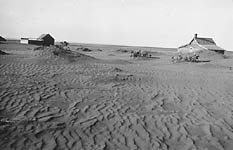
“
I tell you, God must have been punishing us for
the sins of the world in them days.”
— Broadfoot, 1973, 41.
“We ate pig mash mixed with hot, boiling water, mixed with molasses. One of my jobs was to walk over after dark to the garden of the family that looked after the nearest grain elevator, a mile away, and steal carrots, radishes, anything what was growing. I never got caught because their dog was friendly. Never have a friendly dog in a Depression.”
 |
| Farm site suffers from soil erosion. 182 |
“In those days, in those conditions, farming was a slow way of starving.”
“It was just a small wind, but there, always steady
and always hot. A hot sucking wind. It sucked up the moisture. So this wind
just blew and blew, and we had dust storms and times when we kept the lanterns
lit all day. (…) You’ve got to understand, this was no roaring wind.
It was just a wind, blowing all the time, steady as a rock.”
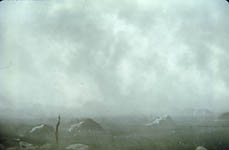 |
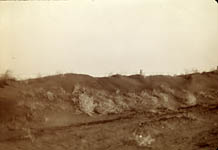 |
| Prairie dust storm. 183 | Wind blown fence-line. 184 |
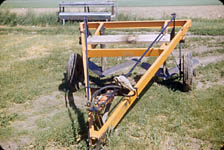 |
| The Noble Blade cut off weeds below the surface
without disturbing stubble and was among the prairie-driven innovations to preserve topsoil. 185 |
“The net income from farm operations in AB, SK and MB in 1928 had been
$363 million. In 1931 it was minus $10,728,000.”
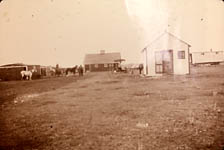 |
"Your suite of 17 Rooms Furnished
in — from Mrs. Clara Leibert, The Wretched in Canada, 61-2. |
| Family Farm 186 |
Many Pool staff and members lived in or near the communities hardest hit by
drought in Saskatchewan, others heard about it and tried to help. Set up in
the fall of 1930, the SWP Rural Relief Fund Staff Auxiliary worked to relieve
stress in an area representing about half of the province. It requested donations
of cash and clothing and concentrated on the provision of clothing to children
of school age, in order that they might be able to continue their classes during
the winter.
“The Wheat Pool Rural Relief Fund, operated on a voluntary basis by the
staffs, is endeavouring to outfit the needy children of school age in all areas
of the province outside the drought area, for which the Red Cross has made itself
responsible. Cash donations amounting to over $4,500 have already been received
by this fund, mainly from the pool staffs and friends of the pool, and in addition
huge supplies of part worn clothing have been received, but with continued applications
the need for help is still great.”
 |
“We realize that many calls of a charitable nature will be made on the growers in your district during the coming winter but, at the same time, we are satisfied that, in asking for the co-operation and support of your committee in this work we are suggesting a service in which many growers will regard it a privilege to participate.” |
| Saskatchewan Pool Elevators Ltd. 187 |
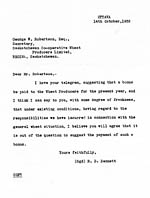 |
| Frustration with lack of government response
to the drought led to the term 'Bennett Buggy' on the prairies. 188 |
Out of the discontent and poverty of the 1930s came many new political movements and ideals in the west. Social Credit in Alberta and the Co-operative Commonwealth Federation in Saskatchewan were among the expressions of western frustration with government in the east.
“During the late 1920s and early 1930s, Prairie Communists made their
most conspicuous attempt to convert the Western farmers to revolutionary socialism.
Their objective was to channel the growing conflict between the non-competitive
small farmers and the emerging industrial producers along class-conscious lines.
Restricted, however, by the demands of the International and by the Toronto-based
executive of the Party, the Prairie Communists failed to develop either a programme
or a local leadership which might win the support of small farmers.”
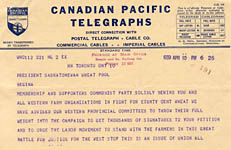 |
| Telegram from T. Buck to Wheat Pool President,
1939. 189 1 | 2 | 3 |
“Eastern Canada on the whole appears to look on Western Canada as a poor relation, living across the tracks, and because we are not allowed to starve we ought to be grateful and submissive.”
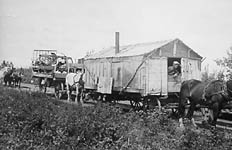 |
 |
| Family leaves the prairie. 190 | Abandoned farmhouse. 191 |
“One response to the crisis was to leave. About 250,000
people moved out of the prairies between 1931 and 1941, reversing the flow of
population for the first time since 1870.”
“In addition to the out-migration, however, prairie
society was also affected by dramatic movements of population within the region,
especially by an exodus from the short-grass plains of the south to the wooded
parkbelt farther north. The number of families who abandoned the dustbowl is
uncertain, but the 1936 census reported almost 14,000 abandoned farms on the
prairies, of which 8,200 were in SK and 5,000 in AB, encompassing 3 million
acres.”
“The Saskatchewan government went in hock in the spring of 1938 for $20
million dollars worth of seed grain that it dispensed to its destitute farming
communities.”
Previous — Over-Payment | Next — Pool Member Loyalty